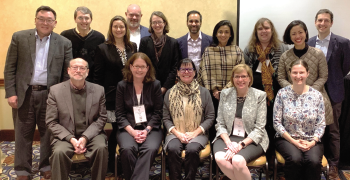
Generations of clinician scholar educators at the 2019 ACR/ARP Meeting.
Investing in rheumatology training is essential to building a strong and capable workforce. Clinician educators are responsible for developing educational programs, instructing rheumatologists to meet accreditation standards and promoting an atmosphere of quality care for patients. Although clinician educators play a critical role in attracting the next generation of rheumatology professionals, faculty pursuing careers as clinical educators can find it challenging to identify sources of guidance and support. The Rheumatology Research Foundation has addressed this gap in career development through the Clinician Scholar Educator (CSE) Award.
This three-year career development award, first awarded in July 1999, is designed to support rheumatology professionals seeking a career in education and training. In addition to enhancing education for musculoskeletal and rheumatic diseases, the award has had a positive effect on trainee exposure to, as well as recruitment into, careers in the specialty. Past CSE Award recipients have both formally and informally mentored award applicants and recipients, and served on the Clinician Scholar Educator Advisory Panel, which was formed in 2008.
As the CSE community of scholars has grown, the group has increasingly recognized the benefit of ongoing communication among recipients. Results from a 2016 study published in Arthritis Care & Research found an unanticipated benefit of the CSE program has been the organic development of a community of educational scholars who meet to collaborate and support each other and their junior colleagues.1
Recipients of the CSE Award devote themselves to developing products and processes using new technologies and methods to better train future rheumatologists. The award provides salary support to allow time for the development of tools and funding to continue career development.
Applications for the CSE Award are due May 1, 2020. For more information and to apply, click here.
Reference
- Berman JR, O’Rourke KS, Kolasinski SL, et al. Rheumatology Research Foundation Clinician Scholar Educator Award: Fifteen years promoting rheumatology educators and education. Arthritis Care Res (Hoboken). 2016 Nov;68(11):1591–1597.


